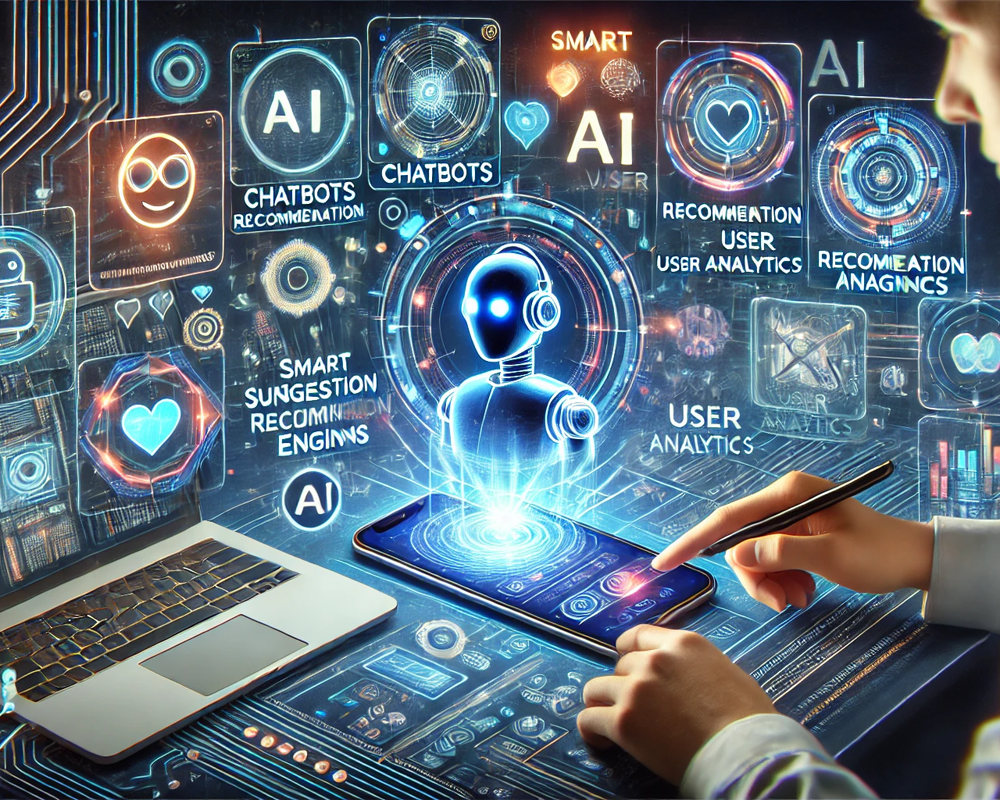The Role of AI in Mobile App Development: Enhancing User Experience
Author: Admin
September 20, 2024
AI in mobile app development personalized user experience natural language processing predictive analytics mobile app security augmented reality app performance optimization. 
In today’s digital age, Artificial Intelligence (AI) is transforming how mobile apps are developed and experienced. The integration of AI into mobile applications is not just about adding a futuristic touch; it’s about fundamentally enhancing the way users interact with their devices. From personalization and improved security to advanced user interfaces and predictive analytics, AI is making mobile apps smarter, more engaging, and tailored to individual needs. In this article, we explore how AI is revolutionizing mobile app development and creating more personalized user experiences.
Personalization: Making Apps More Relevant
One of the most impactful ways AI is transforming mobile apps is through personalization. AI algorithms can analyze user behavior, preferences, and interactions to tailor experiences uniquely for each individual.
- Content Recommendations: Apps like Netflix and Spotify use AI to offer personalized content suggestions based on users' viewing and listening history. This not only keeps users engaged but also helps in discovering new content that aligns with their interests.
- Customized User Interfaces: AI can adjust the app's interface based on user behavior. For instance, if an app notices that a user frequently accesses certain features, it can prioritize these features on the home screen, making navigation more intuitive.
Natural Language Processing (NLP): Enhancing Communication
Natural Language Processing (NLP) is a key AI technology that allows mobile apps to understand and respond to human language. This capability enhances user interaction in several significant ways:
- Voice Assistants: AI-driven voice assistants such as Google Assistant and Siri enable users to interact with apps using voice commands. This hands-free functionality makes app usage more convenient, allowing users to perform tasks without manual input.
- Intelligent Chatbots: AI-powered chatbots provide immediate customer support and assistance within apps. These chatbots can handle common queries, offer product recommendations, and guide users through complex processes, significantly improving customer service.
Predictive Analytics: Anticipating User Needs
AI’s ability to predict user needs and behaviors is a game changer for mobile app functionality. Predictive analytics can anticipate what users might need next, leading to a more seamless experience.
- Health and Fitness Apps: AI analyzes users' activity data to forecast health trends and recommend personalized workout routines or dietary plans. Apps like MyFitnessPal use these insights to offer tailored advice, helping users achieve their health goals more effectively.
- Travel and Lifestyle Apps: AI can predict users' travel preferences based on past behavior, suggesting personalized travel itineraries and real-time updates. This proactive approach enhances user satisfaction by making their travel planning experience more efficient and tailored.
Enhanced Security: Protecting User Data
Security is a major concern in mobile app development, and AI is playing a critical role in safeguarding user data.
- Fraud Detection: AI algorithms monitor transactions for unusual patterns that may indicate fraudulent activity. By detecting anomalies in real-time, AI helps prevent financial losses and enhances the overall security of the app.
- Biometric Authentication: AI enables advanced biometric security features, such as facial recognition and fingerprint scanning. These technologies offer a secure and convenient way for users to authenticate their identity, reducing reliance on traditional passwords.
Performance Optimization: Improving Efficiency
AI contributes significantly to optimizing mobile app performance, ensuring that apps run smoothly and efficiently.
- Smart Caching: AI can predict which content users are likely to access next and pre-load it to reduce waiting times. This predictive caching improves app responsiveness and enhances the user experience.
- Battery and Data Management: AI algorithms analyze app usage patterns to optimize background processes, reducing battery consumption and data usage. This optimization ensures that users have a longer-lasting and more efficient app experience.
Augmented Reality (AR): Creating Immersive Experiences
AI enhances Augmented Reality (AR) applications, making them more interactive and engaging.
- Real-Time Image Recognition: AI-powered image recognition technology allows apps to analyze and respond to visual inputs in real-time. This capability supports features like visual search and interactive AR elements, providing users with immersive experiences.
- Interactive AR Filters: Social media apps use AI to offer creative AR filters and effects. These features engage users by allowing them to overlay virtual elements onto their real-world surroundings, making interactions more enjoyable and interactive.
Conclusion
The integration of AI into mobile app development is revolutionizing the user experience by making apps more personalized, intuitive, and secure. From delivering tailored content and enhancing communication through NLP to predicting user needs and optimizing performance, AI is at the forefront of creating engaging and efficient mobile applications. As AI technology continues to advance, its role in mobile app development will only become more prominent, offering even more innovative features and enriching user experiences.